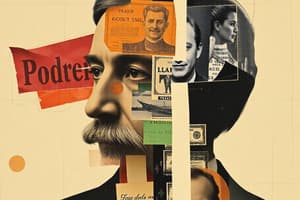Podcast
Questions and Answers
Which of the following traits is NOT associated with Openness?
Which of the following traits is NOT associated with Openness?
- Curiosity
- Flexibility
- Artistic sensitivity
- Sympathy (correct)
Freud believed that childhood experiences play a minimal role in adult personality development.
Freud believed that childhood experiences play a minimal role in adult personality development.
False (B)
What innovative procedure did Freud develop for treating mental disorders?
What innovative procedure did Freud develop for treating mental disorders?
Psychoanalysis
Freud divided personality structure into the id, ego, and ______.
Freud divided personality structure into the id, ego, and ______.
Match the following personality traits with their corresponding descriptions:
Match the following personality traits with their corresponding descriptions:
What does the unconscious contain according to Freud's theory?
What does the unconscious contain according to Freud's theory?
Freud believed that conflicts involving sexual and aggressive impulses are less likely to produce anxiety than conflicts about hunger and thirst.
Freud believed that conflicts involving sexual and aggressive impulses are less likely to produce anxiety than conflicts about hunger and thirst.
What are defense mechanisms according to Freud's theory?
What are defense mechanisms according to Freud's theory?
Rationalization involves creating false but plausible excuses to justify __________ behavior.
Rationalization involves creating false but plausible excuses to justify __________ behavior.
Match the defense mechanisms with their definitions:
Match the defense mechanisms with their definitions:
What is the key concept of behaviourism regarding personality?
What is the key concept of behaviourism regarding personality?
Pavlov's discovery was that animals could be conditioned to respond to neutral stimuli.
Pavlov's discovery was that animals could be conditioned to respond to neutral stimuli.
What kind of stimulus did Pavlov use to evoke salivation in dogs before conditioning?
What kind of stimulus did Pavlov use to evoke salivation in dogs before conditioning?
In Pavlov's experiment, the tone served as a ______ stimulus after conditioning.
In Pavlov's experiment, the tone served as a ______ stimulus after conditioning.
Match the following terms with their definitions:
Match the following terms with their definitions:
Which of the following best describes an unconditioned response?
Which of the following best describes an unconditioned response?
Who first described classical conditioning?
Who first described classical conditioning?
Which of the following is NOT a key idea of the psychodynamic approach?
Which of the following is NOT a key idea of the psychodynamic approach?
Freud proposed that defense mechanisms are strategies used to enhance psychological well-being.
Freud proposed that defense mechanisms are strategies used to enhance psychological well-being.
Name one major criticism of psychodynamic theories.
Name one major criticism of psychodynamic theories.
According to Freud, females tend to develop a weaker __________ than males.
According to Freud, females tend to develop a weaker __________ than males.
Match the following concepts with their descriptions:
Match the following concepts with their descriptions:
Who is credited with establishing behaviorism as a major school of thought in psychology?
Who is credited with establishing behaviorism as a major school of thought in psychology?
Behaviorism emphasizes the study of internal mental processes over observable behavior.
Behaviorism emphasizes the study of internal mental processes over observable behavior.
What type of evidence do critics argue psychodynamic theories rely too heavily on?
What type of evidence do critics argue psychodynamic theories rely too heavily on?
Flashcards
The Id
The Id
The primitive, instinctive part of our personality driven by the pleasure principle, demanding immediate gratification of urges.
The Ego
The Ego
The part of the personality that mediates between the Id's desires and the Superego's constraints, operating on the reality principle.
The Superego
The Superego
The moral component of the personality, representing internalized societal rules and values, often acting as a conscience.
Psychoanalysis
Psychoanalysis
Signup and view all the flashcards
Primary Process Thinking
Primary Process Thinking
Signup and view all the flashcards
What is the unconscious?
What is the unconscious?
Signup and view all the flashcards
What is the role of conflict and defence mechanisms in Freud's theory?
What is the role of conflict and defence mechanisms in Freud's theory?
Signup and view all the flashcards
What are defense mechanisms?
What are defense mechanisms?
Signup and view all the flashcards
What is rationalization?
What is rationalization?
Signup and view all the flashcards
What is repression?
What is repression?
Signup and view all the flashcards
Classical Conditioning
Classical Conditioning
Signup and view all the flashcards
Unconditioned Stimulus (UCS)
Unconditioned Stimulus (UCS)
Signup and view all the flashcards
Unconditioned Response (UCR)
Unconditioned Response (UCR)
Signup and view all the flashcards
Conditioned Stimulus (CS)
Conditioned Stimulus (CS)
Signup and view all the flashcards
Conditioned Response (CR)
Conditioned Response (CR)
Signup and view all the flashcards
Conditioning
Conditioning
Signup and view all the flashcards
Conditioned Reflex
Conditioned Reflex
Signup and view all the flashcards
Psychodynamic Theory
Psychodynamic Theory
Signup and view all the flashcards
Behaviorism
Behaviorism
Signup and view all the flashcards
Defense Mechanisms
Defense Mechanisms
Signup and view all the flashcards
Poor Testability
Poor Testability
Signup and view all the flashcards
Inadequate Evidence
Inadequate Evidence
Signup and view all the flashcards
Study Notes
Theories of Personality
- Personality is a consistent tendency to behave in a particular way across a wide variety of situations.
- Personality is distinctive: Each person is unique.
- Personality is characterised by both consistency and distinctiveness.
Defining Personality
- Personality refers to an individual's unique pattern of consistent behavioural traits.
- Consistency refers to the stability of a person's behaviour over time and across situations.
- Distinctiveness refers to the behavioural differences among people reacting to the same situation.
Personality Traits
- Personality traits are durable dispositions to behave in a particular way in a variety of situations.
- Examples of traits include honest, dependable, moody, impulsive, suspicious.
- Some traits are more basic than others
- Basic traits are the fundamental building blocks of personality.
- For example, a person's tendency to be impulsive, restless, irritable, and impatient might all derive from a more basic tendency to be excitable.
Big Five Personality Traits
- Extraversion: outgoing, sociable, cheerful, friendly, assertive.
- Neuroticism: anxious, hostile, self-conscious, insecure and vulnerable.
- Openness: curiosity, flexibility, vivid fantasy, imaginative, artistic sensitivity and unconventional attitudes.
- Agreeableness: sympathetic, trusting, cooperative, modest and straightforward.
- Conscientiousness: diligent, disciplined, well organised, punctual and dependable.
Psychodynamic Perspectives
- Psychodynamic theories focus on unconscious mental forces.
- Sigmund Freud developed psychoanalysis.
- Psychoanalysis involves lengthy verbal interactions.
- Freud's theories focus on unconscious mental forces in influencing human behaviour.
- Critiques of Freud's theory: argued that unconscious forces govern behaviours and that childhood experiences have a strong influence on adult behaviours. Another critique of Freud's approach is that it focuses excessively on the sexual drives.
Freud's Psychoanalytic Theory
- The id: the primary, instinctive component of personality guided by the pleasure principle, which demands immediate gratification of its urges (to eat, sleep, defecate, copulate, and so on).
- The ego: the decision-making component of personality operating according to the reality principle. The ego mediates between the id and the external world.
- The superego: the moral component of personality representing right and wrong; this internalisation of social standards usually occurs during childhood. Individuals receive training from their adults about which behaviours are good and bad.
Levels of Awareness
- Conscious: thoughts, feelings, and sensations.
- Preconscious: material that can be brought into awareness.
- Unconscious: reservoir of unacceptable thoughts, feelings, memories, and desires.
Conflict and Defence Mechanisms
- Personality is the product of an ongoing series of internal conflicts between the id, ego, and superego.
- Anxiety is distressing.
- Defence mechanisms are unconscious reactions that protect a person from painful emotions; they are mental exercises that work through self-deception.
- Defence mechanisms: rationalisation, repression, projection, displacement, reaction formation, regression, and identification.
Freud's Theory of Psychosexual Stages
- Freud argued that the foundation of an individual’s personality is laid down by the age of 5.
- Psychosexual stages are developmental periods with a characteristic sexual focus that leave their mark on adult personality.
Behavioural Perspectives
- Behaviourism focuses on observable behaviours and argues that psychology should abandon its prior focus on the mind and mental processes.
- Behaviourists prefer to think in terms of response tendencies and believe that personality is a collection of responses.
- Classical conditioning: learning by associating stimuli.
- Operant conditioning: learning through consequences.
- Reward strengthens behaviour; punishment weakens behaviour.
Pavlov's Classical Conditioning
- Classical conditioning: a type of learning in which a neutral stimulus eventually elicits a response originally evoked by another stimulus.
- Acquisition: initial stage of learning in which a neutral stimulus is repeatedly paired with a stimulus that naturally elicits a response.
- Extinction: gradual weakening and disappearance of a conditioned response tendency.
- Key terms: Unconditioned stimulus, unconditioned response, neutral stimulus, conditioned stimulus, conditioned response.
Skinner's Operant Conditioning
- Operant conditioning: A form of learning in which voluntary responses come to be controlled by their consequences.
- Positive reinforcement: occurs when a response is strengthened by the arrival of a pleasant stimulus (ex reward).
- Negative reinforcement: occurs when a response is strengthened by the removal of an unpleasant stimulus.
- Punishment: weakening of a response through the arrival of an unpleasant stimulus.
Bandura and Social Learning Theory
- Bandura's social learning theory emphasizes that personality is largely shaped through learning.
- However, individuals actively process environment.
- Observational learning: learning through observing others.
- Observational learning can take place indirectly and may not always need direct reinforcement.
- Self-efficacy: a person's belief about his or her ability to perform behaviours that would lead to expected outcomes
- Important factors in social learning: attention, retention, reproduction, motivation.
Humanistic Perspectives
- This perspective believes that human beings are conscious, rational, and unique.
- Humanists believe that humans have an innate drive toward personal growth and self-actualisation.
- Humanistic theories are concerned with conditions (evaluations, experiences, and perspectives) that promote personal growth-actualization.
- Carl Rogers viewed personality in terms of ‘self-concept’, which is a collection of beliefs about one’s own nature, unique qualities, and typical behaviour.
- Incongruence: the disparity between a person's self-concept and actual experience.
Maslow's Theory of Self-Actualisation
- Maslow proposed a hierarchy of needs arranged in a hierarchical order, from basic physiological needs to higher-order self-actualisation needs.
- The basic needs must be met in order to progress in moving up the hierarchy.
- Self-actualization is a subjective view of the world and the individual's subjective needs and beliefs influence their behaviour.
- Self-actualization is the highest level in the hierarchy.
Biological Perspectives
- Biological theories of personality explore hereditary roots.
- Twin studies: identical twins exhibit more similar personality traits than fraternal twins, suggesting a hereditary influence.
- Eysenck's theory proposes personality traits are based on inherited tendencies and conditionability.
Evaluation of Perspectives
- Each perspective has its merits and limitations. No single theory fully explains personality.
- Strengths of each perspective: consistency, distinctiveness, empirical research, focus on subjective experience and biological factors affecting behaviour.
- Limitations of each perspective. Poor testability in psychodynamic and humanistic perspectives and lack of adequate theories.
Studying That Suits You
Use AI to generate personalized quizzes and flashcards to suit your learning preferences.




